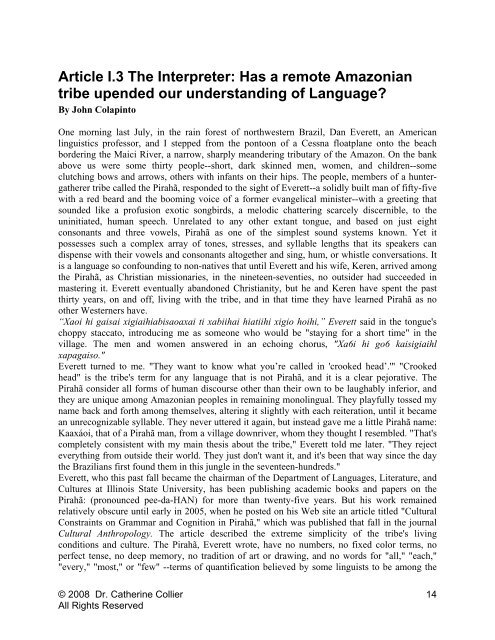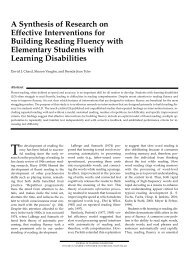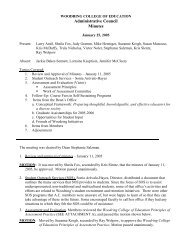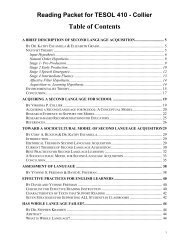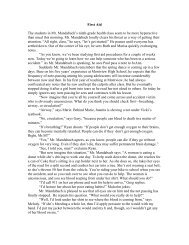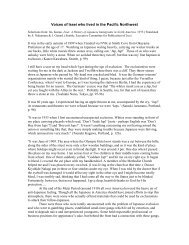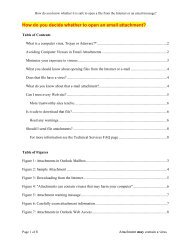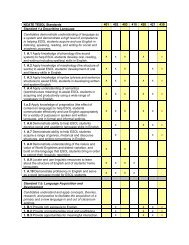<strong>Art</strong>icle I.3 The <strong>In</strong>terpreter: Has a remote Amazoniantribe upended our understanding <strong>of</strong> Language?By John ColapintoOne morning last July, in <strong>the</strong> rain forest <strong>of</strong> northwestern Brazil, Dan Everett, an Americanlinguistics pr<strong>of</strong>essor, and I stepped from <strong>the</strong> pontoon <strong>of</strong> a Cessna floatplane onto <strong>the</strong> beachbordering <strong>the</strong> Maici River, a narrow, sharply meandering tributary <strong>of</strong> <strong>the</strong> Amazon. On <strong>the</strong> bankabove us were some thirty people--short, dark skinned men, women, and children--someclutching bows and arrows, o<strong>the</strong>rs with infants on <strong>the</strong>ir hips. The people, members <strong>of</strong> a hunterga<strong>the</strong>rertribe called <strong>the</strong> Pirahã, responded to <strong>the</strong> sight <strong>of</strong> Everett--a solidly built man <strong>of</strong> fifty-fivewith a red beard and <strong>the</strong> booming voice <strong>of</strong> a former evangelical minister--with a greeting thatsounded like a pr<strong>of</strong>usion exotic songbirds, a melodic chattering scarcely discernible, to <strong>the</strong>uninitiated, human speech. <strong>Un</strong>related to any o<strong>the</strong>r extant tongue, and based on just eightconsonants and three vowels, Pirahã as one <strong>of</strong> <strong>the</strong> simplest sound systems known. Yet itpossesses such a complex array <strong>of</strong> tones, stresses, and syllable lengths that its speakers candispense with <strong>the</strong>ir vowels and consonants altoge<strong>the</strong>r and sing, hum, or whistle conversations. Itis a language so confounding to non-natives that until Everett and his wife, Keren, arrived among<strong>the</strong> Pirahã, as Christian missionaries, in <strong>the</strong> nineteen-seventies, no outsider had succeeded inmastering it. Everett eventually abandoned Christianity, but he and Keren have spent <strong>the</strong> pastthirty years, on and <strong>of</strong>f, living with <strong>the</strong> tribe, and in that time <strong>the</strong>y have learned Pirahã as noo<strong>the</strong>r Westerners have.“Xaoi hi gaisai xigiaihiabisaoaxai ti xabiihai hiatiihi xigio hoihi,” Everett said in <strong>the</strong> tongue'schoppy staccato, introducing me as someone who would be "staying for a short time" in <strong>the</strong>village. The men and women answered in an echoing chorus, "Xa6i hi go6 kaisigiaihlxapagaiso."Everett turned to me. "They want to know what you’re called in 'crooked head’.'" "Crookedhead" is <strong>the</strong> tribe's term for any language that is not Pirahã, and it is a clear pejorative. ThePirahã consider all forms <strong>of</strong> human discourse o<strong>the</strong>r than <strong>the</strong>ir own to be laughably inferior, and<strong>the</strong>y are unique among Amazonian peoples in remaining monolingual. They playfully tossed myname back and forth among <strong>the</strong>mselves, altering it slightly with each reiteration, until it becamean unrecognizable syllable. They never uttered it again, but instead gave me a little Pirahã name:Kaaxáoi, that <strong>of</strong> a Pirahã man, from a village downriver, whom <strong>the</strong>y thought I resembled. "That'scompletely consistent with my main <strong>the</strong>sis about <strong>the</strong> tribe," Everett told me later. "They rejecteverything from outside <strong>the</strong>ir world. They just don't want it, and it's been that way since <strong>the</strong> day<strong>the</strong> Brazilians first found <strong>the</strong>m in this jungle in <strong>the</strong> seventeen-hundreds."Everett, who this past fall became <strong>the</strong> chairman <strong>of</strong> <strong>the</strong> Department <strong>of</strong> Languages, Literature, andCultures at Illinois <strong>Sta</strong>te <strong>Un</strong>iversity, has been publishing academic books and papers on <strong>the</strong>Pirahã: (pronounced pee-da-HAN) for more than twenty-five years. But his work remainedrelatively obscure until early in 2005, when he posted on his Web site an ar<strong>ticle</strong> titled "CulturalConstraints on Grammar and Cognition in Pirahã," which was published that fall in <strong>the</strong> journalCultural Anthropology. The ar<strong>ticle</strong> described <strong>the</strong> extreme simplicity <strong>of</strong> <strong>the</strong> tribe's livingconditions and culture. The Pirahã, Everett wrote, have no numbers, no fixed color terms, noperfect tense, no deep memory, no tradition <strong>of</strong> art or drawing, and no words for "all," "each,""every," "most," or "few" --terms <strong>of</strong> quantification believed by some linguists to be among <strong>the</strong>© 2008 Dr. Ca<strong>the</strong>rine CollierAll Rights Reserved14
common building blocks <strong>of</strong> human cognition. Everett's most explosive claim, however, was thatPirahã displays no evidence <strong>of</strong> recursion, a linguistic operation that consists <strong>of</strong> inserting onephrase inside ano<strong>the</strong>r <strong>of</strong> <strong>the</strong> same type, as when a speaker combines discrete thoughts ("<strong>the</strong> manis walking down <strong>the</strong> street," "<strong>the</strong> man is wearing a top hat") into a single sentence ("The manwho is wearing a top hat is walking down <strong>the</strong> street"). Noam Chomsky, <strong>the</strong> influential linguistic<strong>the</strong>orist, has recently revised his <strong>the</strong>ory <strong>of</strong> universal grammar, arguing that recursion is <strong>the</strong>cornerstone <strong>of</strong> all languages, and is possible because <strong>of</strong> a uniquely human cognitive ability.Steven Pinker, <strong>the</strong> Harvard cognitive scientist, calls Everett's paper "a bomb thrown into <strong>the</strong>party." For months, it was <strong>the</strong> subject <strong>of</strong> passionate debate on social-science blogs and Listservs.Everett, once a devotee <strong>of</strong> Chomskyan linguistics, insists not only that Pirahã is a "severecounterexample" to <strong>the</strong> <strong>the</strong>ory <strong>of</strong> universal grammar but also that it is not an isolated case. "Ithink one <strong>of</strong> <strong>the</strong> reasons that we haven't found o<strong>the</strong>r groups like this," Everett said, "is becausewe've been told, basically, that it's not possible." Some scholars were taken aback by Everett'sdepiction <strong>of</strong> <strong>the</strong> Pirahã as a people <strong>of</strong> seemingly unparalleled linguistic and cultural primitivism."I have to wonder whe<strong>the</strong>r he's some Borgesian fantasist, or some Margaret Mead being stitchedup by <strong>the</strong> locals," one reader wrote in an e-mail to <strong>the</strong> editors <strong>of</strong> a popular linguistics blog.I had my own doubts about Everett's portrayal <strong>of</strong> <strong>the</strong> Pirahã shortly after I arrived in <strong>the</strong> village.We were still unpacking when a Pirahã boy, who appeared to be about eleven years old, ran outfrom <strong>the</strong> trees beside <strong>the</strong> river. Grinning, he showed <strong>of</strong>f a surprisingly accurate replica <strong>of</strong> <strong>the</strong>floatplane we had just landed in. Carved from balsa wood, <strong>the</strong> model was four feet long and hada tapering fuselage, wings, and pontoons, as well as propellers, which were affixed with smallpieces <strong>of</strong> wire so that <strong>the</strong> boy could spin <strong>the</strong> blades with his finger. I asked Everett whe<strong>the</strong>r <strong>the</strong>model contradicted his claim that <strong>the</strong> Pirahã do not make art. Everett barely glanced up. "Theymake <strong>the</strong>m every time a plane arrives," he said. "They don't keep <strong>the</strong>m around when <strong>the</strong>re aren'tany planes. It’s a chain reaction, and someone else will do it, but <strong>the</strong>n eventually it will peterout." Sure enough, I later saw <strong>the</strong> model lying broken and dirty in <strong>the</strong> weeds beside <strong>the</strong> river. Noone made ano<strong>the</strong>r one during <strong>the</strong> six days I spent in <strong>the</strong> village.<strong>In</strong> <strong>the</strong> wake <strong>of</strong> <strong>the</strong> controversy that greeted his paper, Everett encouraged scholars to come to <strong>the</strong>Amazon and observe <strong>the</strong> Pirahã for <strong>the</strong>mselves. The first person to take him up on <strong>the</strong> <strong>of</strong>fer wasa forty-three-year-old American evolutionary biologist named Tecurnseh Fitch, who in 2002 coauthoredan important paper with Chomsky and Marc Hauser, an evolutionary psychologist andbiologist at Harvard, on recursion. Fitch and his cousin Bill, a sommelier based in Paris, weredue to arrive by floatplane in <strong>the</strong> Pirahã village a couple <strong>of</strong> hours after Everett and I did. As <strong>the</strong>plane landed on <strong>the</strong> water, <strong>the</strong> Pirahã, who had ga<strong>the</strong>red at <strong>the</strong> river, began to cheer. The twomen stepped from <strong>the</strong> cockpit, Fitch toting a laptop computer into which he had programmed aweek's worth <strong>of</strong> linguistic experiments that he intended to perform on <strong>the</strong> Pirahã. They werequickly surrounded by curious tribe members. The Fitch cousins, having traveled widely toge<strong>the</strong>rto remote parts <strong>of</strong> <strong>the</strong> world, believed that <strong>the</strong>y knew how to establish an instant rapport withindigenous peoples. They brought <strong>the</strong>ir cupped hands to <strong>the</strong>ir mouths and blew loon calls backand forth. The Pirahã looked on stone-faced. Then Bill began to make a loud popping sound bysnapping a finger <strong>of</strong> one hand against <strong>the</strong> opposite palm. The Pirahã remained impassive. Thecousins shrugged sheepishly and abandoned <strong>the</strong>ir efforts."Usually you can hook people really easily by doing <strong>the</strong>se funny little things," Fitch said later."But <strong>the</strong> Pirahã kids weren't buying it, and nei<strong>the</strong>r were <strong>the</strong>ir parents. Everett snorted. "It's notpart <strong>of</strong> <strong>the</strong>ir nature," he said. "So <strong>the</strong>y're not interested."© 2008 Dr. Ca<strong>the</strong>rine CollierAll Rights Reserved15
- Page 2 and 3: "Those who arrive by age 12 or 13 m
- Page 5: Article I.2 Are Signed Languages "R
- Page 8 and 9: Biological analyses of the status o
- Page 10 and 11: and beyond, speaking and signing ch
- Page 12 and 13: Conclusion: Are Signed Languages Re
- Page 16 and 17: A few weeks earlier, I had called F
- Page 18 and 19: “We struggled even getting to the
- Page 20 and 21: herself by strapping a cassette rec
- Page 22 and 23: In 1998, after nine years as the ch
- Page 24 and 25: momentary burst of excitement that
- Page 26 and 27: can shape core grammar. Because the
- Page 28 and 29: The authors compared animal and hum
- Page 30 and 31: monkey moved. He followed it with h
- Page 32 and 33: delight, fear, laughter, and surpri
- Page 34 and 35: Piipaío in a hut: Pirahã huts typ
- Page 36 and 37: LEP students, and equitable organiz
- Page 38 and 39: 4. Second language development crea
- Page 41 and 42: curriculum or "teaching to the test
- Page 43 and 44: portfolio work was scanned and stor
- Page 45 and 46: experiences of many groups of stude
- Page 47 and 48: While not disagreeing that interpre
- Page 49 and 50: sound educational practice, however
- Page 51 and 52: arises from the efforts to abstract
- Page 53 and 54: Article II.2 Cross-Cultural Communi
- Page 55 and 56: males who can serve as positive rol
- Page 57 and 58: Understanding another culture is a
- Page 59 and 60: Pets and AnimalsWhich animals are v
- Page 61 and 62: to teach standard English is reflec
- Page 63 and 64: Asking personal questions of a pers
- Page 65 and 66:
Using Cross Cultural Communication
- Page 67 and 68:
Why Do Nonstandard English-Speaking
- Page 69 and 70:
Before beginning to teach standard
- Page 71 and 72:
• Negative attitudes toward low p
- Page 73 and 74:
New standardized tests and assessme
- Page 75 and 76:
Each of the behaviors listed above
- Page 77 and 78:
Article II.3 Hard Work Hypothesis:
- Page 79 and 80:
each point higher in SES, students
- Page 81 and 82:
This case does not provide strong s
- Page 83 and 84:
Article II.4 Language Acquisition a
- Page 85 and 86:
1992, p. XI). These researchers, wh
- Page 87 and 88:
comprehend a word within a specific
- Page 89 and 90:
more to the truthfulness of the chi
- Page 91 and 92:
This idea of “semilingualism” c
- Page 93 and 94:
Article III.1 A Brief Description o
- Page 95 and 96:
take different lengths of time to c
- Page 97 and 98:
example, should involve the same co
- Page 99 and 100:
As with all stages of BICS acquisit
- Page 101 and 102:
Assessment techniques at stage 3 ca
- Page 103 and 104:
different. Therefore, the social di
- Page 105:
integrative motivation. Basically,
- Page 109 and 110:
(Ellis, 1985; Hakuta, 1986). Howeve
- Page 111 and 112:
that sociocultural processes have o
- Page 113 and 114:
Article III.3 How Children Acquire
- Page 115 and 116:
phonetic units (unique to signed la
- Page 117 and 118:
Article III.4 Toward a Sociocultura
- Page 119 and 120:
emember is that the fundamental goa
- Page 121 and 122:
The best practices models can be th
- Page 123 and 124:
By focusing on the dialectic betwee
- Page 125 and 126:
intergenerational wisdom shared by
- Page 127 and 128:
Daily Realities RecappedThe above v
- Page 129 and 130:
traditions. At a time in our histor
- Page 131 and 132:
We will now look at two examples of
- Page 133 and 134:
Speakers communicate fluently, main
- Page 135 and 136:
question the effects of such attitu
- Page 137 and 138:
Article IV.3 Culture Change: Effect
- Page 139 and 140:
and psychological characteristics o
- Page 141 and 142:
Contraryto what wewere expecting, t
- Page 143 and 144:
Article V.1 Assessment in ESL & Bil
- Page 145 and 146:
vocabulary does the student lack?Is
- Page 147 and 148:
whether they are LEP and to provide
- Page 149 and 150:
Fourth, ESL and bilingual program s
- Page 151 and 152:
competent reader/writer. All versio
- Page 153 and 154:
Table 1Comparison of Recent Accultu
- Page 155 and 156:
unilinear model, which measures the
- Page 157 and 158:
an English-only instructional progr
- Page 159 and 160:
Article V.3 Assessment of English L
- Page 161 and 162:
8. Change answers only for a very g
- Page 163 and 164:
Riles, 1979; Jose P. v Ambac, 1983)
- Page 165 and 166:
proficiency is often underestimated
- Page 167 and 168:
Finally, when second language reade
- Page 169 and 170:
for their decisions, noting issues
- Page 171 and 172:
As mentioned above, when the transi
- Page 173 and 174:
ather than generic adjectives and t
- Page 175 and 176:
their imagined points of view. Ther
- Page 177 and 178:
English texts and demonstrate progr
- Page 179:
using inter-district teams). In the


